|
|
|
Sort Order |
|
|
|
Items / Page
|
|
|
|
|
|
|
| Srl | Item |
| 1 |
ID:
187503
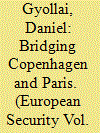

|
|
|
|
|
| Summary/Abstract |
Integrating the discursive and practice-based approach to securitisation, this article explores how the police function as the audience of securitising discourse. Taking the Hungarian case of border control, it looks into how the police accept and buy into anti-immigrant discourses of the political elite. Based on a questionnaire survey of Hungarian police officers, it demonstrates the potential of discursive legitimation in shaping officers’ understanding of mass migration. It describes the ways in which attitudes and hence, arguably, practice can be conditioned by securitising discourse. The overall aim of the article is to advance the understanding of the narrative dimension of power struggles between police and the political elite, and how that structures the field of border security. Critical security scholars have pointed out that police filter securitising discourse based on their professional dispositions and preferences. However, the Hungarian case seems to suggest that discourse may, in fact, influence dispositions themselves.
|
|
|
|
|
|
|
|
|
|
|
|
|
|
|
|
| 2 |
ID:
187498
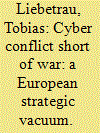

|
|
|
|
|
| Summary/Abstract |
Cyber conflict short of war plays an increasingly important role in contemporary security politics. Dedicated to a study of three European NATO members – the Netherlands, France and Norway, this article expands the existing focus of the study of cyber conflict short of war beyond its dominating US context. It compares and assesses how the countries perceive and respond to a changing strategic environment characterised by increasing cyber conflict short of war. The analysis demonstrates that all three countries acknowledge that cyber operations short of war alter the strategic environment and challenge the idea of deploying offensive cyber capabilities as purely a warfare matter. However, it also identifies a strategic vacuum, as none of them have formulated strategies that describe in detail how military and intelligence entities are supposed to approach and manage the new strategic environment. The article asserts that the current lack of strategic guidance is a fundamental challenge that puts European societies at risk and undermines democratic governance as navigating the new space of strategic cyber competition is a significant challenge to contemporary European statecraft. It concludes by noting three avenues for how to ameliorate this situation and fill the vacuum.
|
|
|
|
|
|
|
|
|
|
|
|
|
|
|
|
| 3 |
ID:
187502
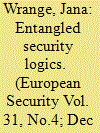

|
|
|
|
|
| Summary/Abstract |
Entangled logics, which attribute meaning to security, characterise the contemporary security field, bringing about broad comprehensions and ambiguous concepts. Civil defence has (re)surfaced as one such concept that is broadly conceived in the official discourses produced by decision-makers. Since security is ultimately enacted by practitioners, alias decision-takers, their interpretations of concepts significantly shape policy actions. Therefore, this article moves from decision-makers’ discourses to decision-takers’ interpretations and explores the divergent understandings of the concept of civil defence in Sweden. Applying a discursive approach to data gathered through official documents and interviews with 21 national agency representatives, organised under five societal sectors, it finds that two main interpretations emerge, across and within sectors. These are conceptualised as “territorial civil defence” and “societal civil defence”, linked, respectively, to logics of “territorial security” and “societal security”. These differences, as is argued, potentially challenge agency collaboration and eventual policy coherence in terms of policy aims, governance and venues for cooperation. Hence, the study highlights the complex constraints that contemporary security discourses set in the policy sphere. It concludes that in order to effectively meet and capture the complexity of contemporary security, disentanglement of the field’s concepts, both in theory and in practice, is needed.
|
|
|
|
|
|
|
|
|
|
|
|
|
|
|
|
| 4 |
ID:
187499
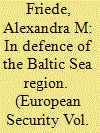

|
|
|
|
|
| Summary/Abstract |
This article analyses changes in national defence policies across the Baltic Sea region after the exogenous shock of the Ukraine crisis in 2014. It draws on Punctuated Equilibrium Theory for theoretical guidance, particularly to understand the mechanisms leading to large-scale policy change after periods of relative stability. Since the outbreak of the Ukraine crisis, defence budgets in the Baltic Sea region have increased dramatically. Baltic Sea states invested in neglected capability development and redirected policy planning towards territorial and collective defence. By contrast, the Russian-Georgian conflict in 2008 had a negligible effect on the paradigm guiding defence planning processes, delayed and lukewarm policy responses let adaptation pressure grow. The empirical findings suggest that policy change reinforced post-2014 because a normative consensus emerged on why Europe's security order is at risk, a critical threshold of urgency was reached, setting off positive feedback cycles, and receptive policy venues, such as NATO, as well as capable external policy actors, such as the USA and the UK, put Baltic Sea security back on the agenda.
|
|
|
|
|
|
|
|
|
|
|
|
|
|
|
|
| 5 |
ID:
187500


|
|
|
|
|
| Summary/Abstract |
This paper investigates the extent to which the European Union is strategically engaging against terrorism. It builds on traditional scholarship on strategic thinking and elaborates an analytical framework to empirically assess strategic policy formulation at the supranational level in the case of terrorism. The framework revolves around three analytical categories: i) threat assessment; ii) objectives setting; and iii) policy measures. Through qualitative content analysis of text data, we show that, while objectives are clearly presented in the documents, the threat that the strategy is supposed to counter is unspecified. In addition to that, the formulation of concrete policy measures remains largely vague. Overall, the article adds to the growing academic debate on EU security governance and offers fresh empirical insights on strategic thinking in counterterrorism policy.
|
|
|
|
|
|
|
|
|
|
|
|
|
|
|
|
| 6 |
ID:
187501
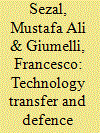

|
|
|
|
|
| Summary/Abstract |
State defence and security policies rely mostly on their military capabilities. The latter are ensured through research and development (R&D) as well as procurement, which are subject to defence industry dynamics. Furthermore the defence sector is heavily dependent on public funds; the latter can be more easily allocated if related R&D has a spill-over effect on the civilian sector, creating the potential for a bigger and more globally (or regionally) integrated market. This article investigates, then, how technology moves, and whether defence sector innovations create spin-offs in the civilian sector in the Netherlands. We aim to provide an industry-centred perspective on defence sector dynamics and potentials. For this, the article attempts to answer the following questions: Are defence technologies transferred to the civilian sector? What lessons can be derived from the Dutch case? To address these research puzzles the article’s theoretical framework builds on the technology-transfer literature in analysing the case study of the Netherlands. The basis for this is 23 interviews with representatives of Dutch defence companies that were carried out both in a workshop and in one-to-one settings in May and June 2020.
|
|
|
|
|
|
|
|
|
|
|
|
|
|
|
|
| 7 |
ID:
187504
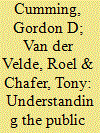

|
|
|
|
|
| Summary/Abstract |
Strategic narratives now face unrealistic expectations as to what they can achieve in the military field. This article asks when and how such narratives lose traction during protracted military interventions. To address these questions, which are crucial at a time when so much modern warfare takes place in the “fourth” dimension, this study develops a conceptual framework that focuses initially on the weakening of a narrative’s content and, subsequently, on its loss of normative resonance and verisimilitude. The latter two factors are beyond the control of even the most skilful strategic narrator, particularly where narratives are required to appeal to audiences with different norms. Our framework is applied to the case of France’s military operations in Mali (Serval) and the Western Sahel (Barkhane). It finds that, whereas France’s compelling Serval narrative was congruent with strong French and Malian public backing, its Barkhane narrative weakened over time, resonating less with prevailing societal norms, becoming less attuned to events on the ground and ultimately coinciding with a sharp decline in public support in France and Mali. It concludes that strategic narratives afford agency to policymakers but are constantly open to contestation and struggle to cope with diverse audiences and deteriorating “evenemential” contexts.
|
|
|
|
|
|
|
|
|
|
|
|
|
|
|
|
|
|
|
|
|